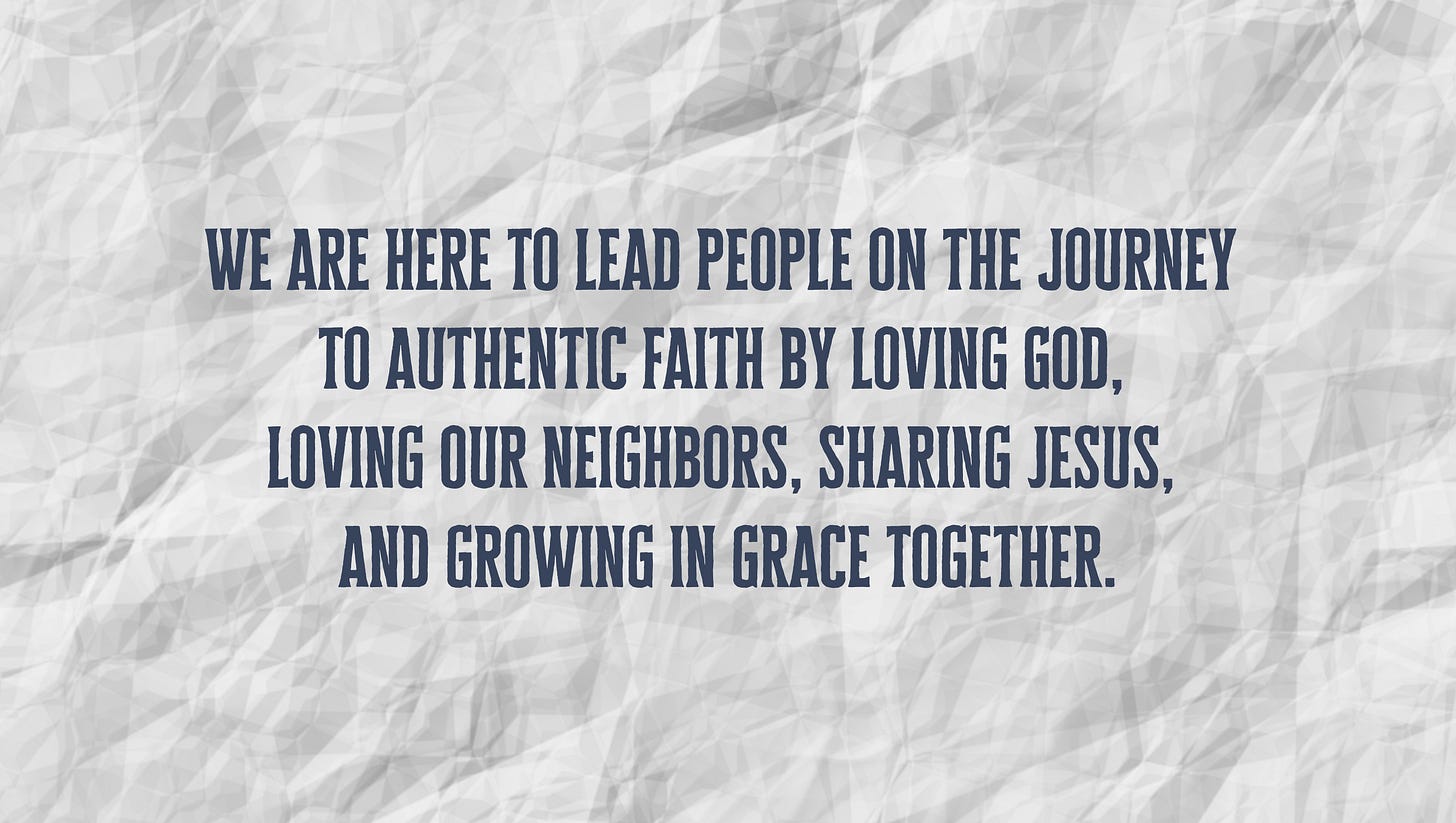Every three months or so, I have the privilege of teaching a class for those interested in becoming members of our church or those who just want to learn more about our faith community. In that class, I tell my story, the church’s story, and how God brought us together. And part of that includes the origin of the purpose statement we recite every week.
Those twenty-five words were forged almost ten years ago when we spent more than a few Wednesday evenings together for what we called Vision Nights. Many of you were here back then, many of you were not, and that’s great! Because of that, and given the importance we place on our purpose statement, I would like to take us through a summer series on our purpose statement, titled “Why We’re Here.” And I'd like to begin today with a little experiment I conducted with something you’re likely already familiar with. Let me go ahead and say I’m sorry, but I just could not help it. I asked an AI to rephrase our purpose statement in the voice of famous characters. The first is for the ladies; here is Jane Eyre’s version.
In this hallowed place, our purpose is as clear as a moral compass's needle, pointing unerringly toward true north. We are here to guide souls upon the arduous, yet ultimately rewarding, journey to authentic faith. It is a path not paved with earthly riches, but with the quiet, profound acts of the heart.
Our duty is to first love God with the entirety of our being—a devotion as steadfast as the ancient oaks. From that wellspring of affection, we extend our gaze to our neighbors, a love that knows no bounds of station or circumstance.
Then, with voices both firm and gentle, we share Jesus, the very source of our hope and salvation, for to hoard such a treasure would be a spiritual impoverishment. And finally, in this communal devotion, we strive to grow in grace together, each soul a lamp lending its light to another, illuminating the path so none may stumble in the encroaching darkness.
For the guys, here it is as if it were the promo for an action movie.
IN A WORLD… where doubt is the enemy and hope is a forgotten language, one team is on a mission.
Their objective: to lead the lost on a perilous quest. Not for treasure or glory, but for something far more valuable. AUTHENTIC FAITH.
Their weapons are not steel or fire. They are something far more powerful. A radical love for a higher power. A fierce compassion for every NEIGHBOR. And a message that shatters the darkness.
They are not just a team; they are a unit, a growing force, forging strength in unity as they GROW IN GRACE TOGETHER.
One journey. One faith. One fight.
THIS MISSION IS EVERYTHING.
COMING SOON.
Please let me share two more from my favorite TV characters of all time. Here’s Ron Swanson from Parks and Rec.
Listen. The mission is simple. No frills, no singing, no hand-holding.
First, you find God. Not in a book club, but in the quiet of the woods, building a canoe.
Then, you mind your own business, but if your neighbor is out of bacon, you give him bacon. That's called loving your neighbor. It's practical.
Next, you tell people about Jesus. No need for a PowerPoint. Just the facts.
And you do it all together. Because you can't build a sturdy table alone. That's growing in grace. It's the only way to build something that lasts.
Now, get to it. I'm building a birdhouse.
And here’s Michael Scott from The Office.
Alright, listen up, people! Gather 'round. This is... this is our mission statement. But it's more than that. It's like our creed. Our Dunder Mifflin Infinity Creed.
So, we're here to lead people... on a journey. And not just any journey, like a road trip to the corporate office in New York where they have a whole floor dedicated to a gym, which, by the way, I would use. This is a journey to authentic faith. It's real. Like, "I declare bankruptcy!" real.
And how do we do it? We do it with heart! It's all about love. We're loving God, which is great, you know, He's the ultimate boss. I'm like his... regional manager. But more importantly, we're loving our neighbors. Like, if Dwight needed a beet, I would give him a beet. Or a thousand beets. I'm a giver.
And we're sharing Jesus. Think of it like a group sales pitch, but for souls. We're all on the sales team! We're doing a cold call, but it's a warm call because it's about love.
And we're growing in grace together. It's like a family. It's like... us. The Office. We grow and we fail together, and sometimes we have to have a diversity day, but we always come out stronger. Just like a group hug. A big, messy, beautiful group hug. Because that's what a family is. And this... this is my family.
Regardless of how you phrase it, our purpose statement is important because it serves as the overarching reason for our existence and what our vision and mission flow from. I’m not naive enough to think we always get it right, but we aim to organize, plan, unite, budget, and everything else around it. That’s why we retell it each week.
Those many years ago, we didn’t just come up with this statement on our own. We didn’t even use AI, but instead referred to a very ancient and credible source to determine our reason for existence. Of course, I’m talking about the Bible. And of all the books in the Bible, Acts is where we started because it records the birth of the church. And that’s found in Acts chapter two.
1 And when the day of Pentecost had fully come, they were all together in one place. 2 And suddenly there came from heaven a noise like a violent rushing wind, and it filled the whole house where they were sitting. 3 And there appeared to them tongues like fire distributing themselves, and they rested on each one of them. 4 And they were all filled with the Holy Spirit and began to speak with other tongues, as the Spirit was giving them utterance. 5 Now there were Jews living in Jerusalem, devout men from every nation under heaven. 6 And when this sound occurred, the multitude came together, and were bewildered because each one of them was hearing them speak in his own language. 7 So they were astounded and marveling, saying, “Behold, are not all these who are speaking Galileans? 8 “And how is it that we each hear them in our own language in which we were born? 9 “Parthians and Medes and Elamites, and residents of Mesopotamia, Judea and Cappadocia, Pontus and Asia, 10 Phrygia and Pamphylia, Egypt and the district of Libya around Cyrene, and visitors from Rome, both Jews and proselytes, 11 Cretans and Arabs—we hear them in our own tongues speaking of the mighty deeds of God.” 12 And they all continued in astonishment and great perplexity, saying to one another, “What does this mean?” 13 But others, mocking, were saying, “They are full of new wine.” Acts 2:1–13 (LSB)
When the Spirit came down and filled those first disciples 2,000 years ago, it heralded a new way God worked in the world. It was still through his Son, Jesus, but his hands and feet and mouth would manifest through his Spirit-filled fellowship of followers, AKA the church. Isn’t it ironic and even kind of humorous that outsiders thought those first believers were drunk? The Apostle Peter stands up to explain that they were not; they were experiencing what the OT prophets had foretold.
14 But Peter, taking his stand with the eleven, raised his voice and declared to them: “Men of Judea and all you who live in Jerusalem, let this be known to you and give heed to my words. 15 “For these men are not drunk, as you suppose, for it is the third hour of the day; 16 but this is what was spoken through the prophet Joel: 17 ‘And it shall be in the last days,’ God says, ‘That I will pour out My Spirit on all mankind; And your sons and your daughters shall prophesy, And your young men shall see visions, And your old men shall dream dreams; 18 Even on My male slaves and female slaves, I will in those days pour out My spirit And they shall prophesy. 19 ‘And I will put wonders in the sky above And signs on the earth below, Blood, and fire, and vapor of smoke. 20 ‘The sun will be turned into darkness And the moon into blood, Before the great and awesome day of the Lord comes. 21 ‘And it will be that everyone who calls on the name of the Lord will be saved.’ Acts 2:14–21 (LSB)
And so the mission of the church begins, a mission Jesus had prescribed and prophesied in Acts 1.
6 So when they had come together, they were asking Him, saying, “Lord, is it at this time You are restoring the kingdom to Israel?” 7 But He said to them, “It is not for you to know times or seasons which the Father has set by His own authority; 8 but you will receive power when the Holy Spirit has come upon you; and you shall be My witnesses both in Jerusalem, and in all Judea and Samaria, and even to the end of the earth.”
After recording Peter’s sermon on Pentecost, Luke includes a snapshot of what the earliest church was like. Six verses comprise one of the most important texts in all of Scripture for churches, particularly when we remember that the church is composed of people, not a building or institution.
42 And they were continually devoting themselves to the apostles’ teaching and to the fellowship, to the breaking of bread and to the prayers. Acts 2:42 (LSB)
The first thing we note about the church is her devotion. The Greek word that’s translated from implies “continuous and persistent tenacity.” Those first Christians were tenacious about four things:
(1) The apostles’ teaching
The apostles’ teaching in that day is the New Testament Scriptures in our day. This is why the Bible is so important to the church. We are also able to devote ourselves to the apostles’ teaching through the preaching, teaching, and discipling ministries of a local church.
They were devoted to the Apostles’ teaching, and they were also tenaciously committed to,
(2) The fellowship
What do we Baptists think of when we hear fellowship? Potlucks. We are tenaciously devoted to potlucks for sure. Even though fellowship here implies the sharing of meals, it’s so much more than that. The same Greek word used here (koinōnia) is also translated “contribution,” “sharing,” and “participation” in the NT. It embodies the notion of participating in and contributing to a shared experience among a group of people with an active presence.
They were devoted to the Apostles’ teaching and the fellowship as well as,
(3) The breaking of bread
This refers particularly to a coming together on the first day of the week (Sunday) to worship by singing hymns and celebrating what we call the Lord’s Supper. They shared a meal at someone’s home, where everyone brought what they could (much like a potluck).
That’s the origin story for what most churches do today. We come together on the first day of the week for worship and the Lord’s Supper.
Finally, they were tenacious about,
(4) The Prayers
The book of Acts is filled with examples of the church praying. Our version of a prayer meeting today probably wouldn’t impress them.
So, the early church was passionate about, tenaciously devoted to the apostles’ teaching, the fellowship, the breaking of bread, and the prayers. JD Greear, in a sermon on this text, talks about how he has often heard someone say, “‘I quit going to small group (or a church) because I just wasn’t getting that much out of it.’ But look at the way this is phrased: they ‘devoted themselves’ or put another way they ‘gave themselves away’ to these things.” He says the point is not really how much you’re getting out of it. The point is to start giving yourself away, to start investing yourself in it.
There’s more.
43 And fear came upon every soul; and many wonders and signs were taking place through the apostles. Acts 2:43 (LSB)
The Greek word translated as fear here (also translated as awe) is found quite a bit in the NT. Sometimes it means dismay or dread, as in when the people feared to speak openly about Jesus because of the Jewish leaders. However, when it involves the presence of God or His works, it signifies a holy reverence. The hand of God was so evident, powerful, and otherworldly in the early church that it brought a sacred wonder with it.
These members of the newborn church weren’t discussing the weather, the Greek games, or the state of current events in the Roman Empire. They were talking about what God was doing in their lives and in their fellowship. People outside the church were too. Next verse,
44 And all those who had believed were together and had all things in common; 45 and they began selling their property and possessions and were dividing them up with all, as anyone might have need. Acts 2:44–45 (LSB)
Early believers who had some means were so moved by what God was doing and so loved their brothers and sisters in Christ that they sold their possessions to aid those believers who had little or nothing. They were supremely selfless.
Finally, Luke writes of those first Christians:
46 And daily devoting themselves with one accord in the temple and breaking bread from house to house, they were taking their meals together with gladness and sincerity of heart, 47 praising God and having favor with all the people. And the Lord was adding to their number daily those who were being saved. Acts 2:46–47 (LSB)
That’s a beautiful picture of the church and certainly convicts us of what our church should be, but what does it have to do with our purpose?
Consider how Rick Warren reverse-engineers this text to frame the purpose of the church through the lens of growth (because that’s the heart of what Luke recorded—a fellowship of believers growing in five ways).
A church exists to grow,
Warmer through fellowship—all those who believed were together and had all things in common
Deeper through discipleship— And they were continually devoting themselves to the apostles’ teaching
Stronger through worship—breaking bread from house to house
Broader through ministry—they began selling their property and possessions and were dividing them up with all, as anyone might have need.
Larger through evangelism— the Lord was adding to their number daily those who were being saved.
We certainly get the idea of what a church’s purpose is from that, but way before the church was born, Jesus gave us two commandments that tell us the same thing, just in a different way, and I bet you’ve never thought about it.
The first is the Great Commandment.
37 And He said to him, “‘You shall love the Lord your God with all your heart, and with all your soul, and with all your mind.’ 38 “This is the great and foremost commandment. 39 “And the second is like it, ‘You shall love your neighbor as yourself.’ 40 “On these two commandments hang the whole Law and the Prophets.” Matthew 22:37–40 (LSB)
The second is the Great Commission
19 “Go therefore and make disciples of all the nations, baptizing them in the name of the Father and the Son and the Holy Spirit, 20 teaching them to keep all that I commanded you; and behold, I am with you always, even to the end of the age.” Matthew 28:19–20 (LSB)
Now let’s do the math.
Love the Lord with all our hearts, minds, souls, and strength — worship.
Love our neighbor as ourselves — ministry.
Go and make disciples — evangelism
Baptize them — fellowship
Teach them to obey — discipleship
So, Jesus in the Gospels and Luke in Acts give us the five elements of a church’s purpose. See if you can find those elements in our purpose statement.
We are here to lead people on the journey to authentic faith (discipleship) by loving God (worship), loving our neighbors (ministry), sharing Jesus (evangelism), and growing in grace together (fellowship).
When we turn to the Bible, we discover that the purpose of the church—the reason we are here right now—is to grow in our love for God and our neighbor, to increase our efforts to reach others for Christ, and to deepen our fellowship and discipleship. And that Biblical truth is the heart of our purpose statement.
But it’s even more than that. The wording of our purpose statement, as well as the way we incorporated the five growth elements directly from Scripture, is intended to convey even more. We will look at that next time.











LOVE the Michael Scott and Ron Swanson purpose statements! Spot on.